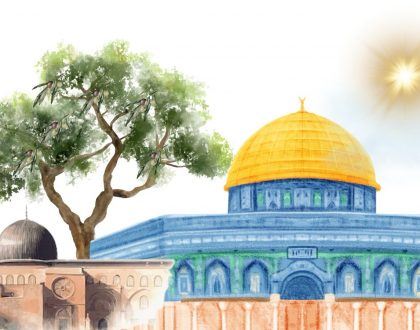The Nativity
by Hana
Everyone knows the story of the nativity.
Mary, heavily pregnant with the child of God, and fiancée Joseph, ride a donkey to Bethlehem; the only place available for them to spend the night is a stable where baby Jesus is born. An angel tells some shepherds and three kings that a king has been born, and they pay a visit to the stable.
In Islam, although we follow the Prophet Muhammad PBUH, we also believe in all the biblical prophets who came before him, such as Noah, Abraham, Moses, and of course Jesus. But our story of his birth is somewhat different:
Joseph? No.
Donkey? No.
Not the stable.
Not the shepherds.
And no kings either.
Which just leaves us with Mary.
You might not expect it, but Mary, or Maryam in Arabic, is incredibly highly regarded in Islam, with some scholars even considering her a prophet in her own right. One of the chapters of the Quran is dedicated to her, and she is one of just four women guaranteed paradise.
The Bible refers to Mary as a humble village woman, just no one special really. In Islam, on the other hand, we are told that Mary’s father was Imran*, chief Rabbi of Jerusalem and a minor prophet in his own right, whose family was one of the ones ‘raised above all mankind’ [3:33] – i.e. she came from a noble family and was already special before she was even born.
Speaking of which, her birth was a miracle in and of itself. Imran* and his wife Hanna were too old to have children, but it was still Hanna’s deepest wish, so she made a promise to God that if she had a baby she would dedicate him to the service of the temple in Jerusalem. To her surprise, she fell pregnant after all, but she was shocked, nine months later, when she gave birth to a daughter.
She said, ‘My Lord, I have delivered a female, and God knows best what I have delivered, and male is not like the female,’ [3:36] And she was right: male is not like the female. If her child had been a boy, there would have been no way he could have gone on to do what Maryam did – mother a miracle child who would change the world.
It’s important to note here that while Muslims acknowledge that Jesus was incredibly special and honoured above most of mankind, that doesn’t change the fact that he was still a member of mankind. One of the two major differences between Christianity and Islam is that where Christians say that Jesus was God’s son, the fundamental basis of Islam is that God is beyond our comprehension: he has no partners or family, and no one can ever be anything like him. While Jesus was undoubtedly a prophet and messenger of God, Muslims maintain that he was still a human: he still carried out basic human functions such as eating and sleeping, which God is above.
However, we do believe that Jesus, like all prophets, was blessed with the ability to perform miracles. It’s interesting to note that the miracles each prophet was granted are whatever is relevant to the historical context. Moses’ people needed to escape from Pharaoh, so he parted the Red Sea, and magic was highly prized in the Pharaoh’s court at that time, so he was able to turn his staff into a snake. At the time of Jesus, healing was of more interest, so Jesus’ miracles lay more in that area – curing leprosy and blindness, and bringing people back to life.
But returning to the story: having had a baby daughter, Hanna thought she wouldn’t be able to honour her oath: giving girls to the temple was absolutely unheard of. But what could she do? She’d made a vow to God, and she had to keep it. Maryam was sent to live in the temple, where she was looked after by her uncle, Zakariya*, who was also a prophet and the father of Yahya*, or John. Maryam spent her childhood and youth living and being educated in a room above the temple, and grew up, unsurprisingly, to be a very spiritual and mature young woman. Which brings us to the Muslim version of the nativity.
How would you react if someone told you that you were pregnant?
One thing – in fact the only thing in terms of this story – that Islam and Christianity have similar accounts of, is that the angel Gabriel came to Maryam one day to tell her she would have a baby. But in elevating her to such a high status, it’s easy to forget that she was just a person, not much older than some of the sixth form, with perfectly human thoughts and emotions, and her reaction was the same as any of ours might be: shock, confusion, disbelief, fear.
Now beyond this point there’s not much to let you know that these two are even versions of the same story. First off, Joseph is notably absent from the Muslim version. While two gospels of the New Testament contain detailed lineages of Jesus as the son of Joseph, Islam is very clear on the fact that miracle Jesus had no father, and hence I’ve never been able to find a single mention of Joseph in any Islamic text whatsoever.
Instead, we are told that Mary went away from her family, to a remote place where she would be alone. When she went into labour, she took shelter under a palm tree. Where the Bible glosses over the actual birth, the Quran describes the birth as an actual event. Although he originated from a miracle, his birth was entirely natural. He didn’t magically materialise; Maryam went through agonising childbirth just like any other mother, and in the Quran we have a description of the pain so severe that she wishes she had died so she didn’t have to go through it.
We are told that a voice spoke to her from under the tree, telling her not to be afraid and to shake the tree, which dropped dates for her to eat: ‘Grieve not, for your Lord has provided a spring beneath you. And shake towards you the trunk of the palm tree, and it will drop on you fresh ripe dates.’ [19:24-25] So Maryam did as she was told, and was provided for.
When she returned home, people saw her baby and accused her of unchastity. God had instructed her to stay silent, so Maryam simply gestured to her child, and he – a newborn baby, just a few days old – saying: ‘I am indeed a servant of God; He has given me the Book and made me a Prophet, and He has made me blessed wherever I may be, and He commands me to perform prayer and give charity as long as I live; He has made me kind to my mother and not severe and hard-hearted. So peace is on me the day I was born, the day that I die and the day that I shall be raised to life.’ [19:30-33]
The Quranic chapter on Maryam was revealed at a time when Muslims in Makkah were being brutally tortured and even killed for their beliefs. To escape persecution, many of them emigrated to Ethiopia – or Abyssinia at the time – for asylum. The ruler of the country was King Negus, a Christian, and these verses were revealed at the time to enable the migrants to recite them to the him. He saw that both faiths were forks of the same path and shared a common God. He was moved to tears, and allowed the refugees to settle and gave them protection from the people of Makkah, who pursued them with violent intent.
So, while the Islamic version of the story may differ in many details, both faiths acknowledge the birth of Christ as a major miracle. And while Muslims do not accept that Jesus was the son of God, we have a huge amount of respect both for him and Mary. The example of the Christian king shows the beauty of religious tolerance.
Years later, when Islam had spread throughout the Middle East and reached Jerusalem, Umar – the Prophet Muhammad’s companion who was now the ruler of the Muslims – arrived there. He visited the Church of the Holy Sepulchre, where he was invited to pray inside the Church, but Omar declined so as not to set a precedent and thereby endanger the Church’s status as a Christian site. Instead he prayed outside in the courtyard where a mosque was later built. He also invited Jewish families, who had been kept out by the Byzantines for centuries, to settle in Jerusalem and build a synagogue. A covenant assuring the safety of non-Muslims was displayed in the mosque, and thus, all three faiths, sharing a common history, lived side by side in harmony.
*peace be upon him
Written by Hana Khan in 2017
Recommended Posts

Masjid al Aqsa – why it has a very special place in our hearts
November 29, 2023

Palestine: The Holy Land
November 23, 2023

